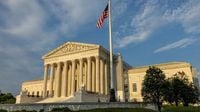In a significant legal development, the U.S. Supreme Court has temporarily halted the deportation of a group of Venezuelan migrants accused of gang affiliations under the Alien Enemies Act, a law dating back to 1798. The ruling, issued early on April 19, 2025, comes after an emergency appeal from the American Civil Liberties Union (ACLU) and raises questions about the treatment of immigrants under the Trump administration's recent policies.
The Supreme Court's order prevents the government from removing any member of the detainee group until further notice, stating, "The government is directed not to remove any member of the putative class of detainees from the United States until further order of this court." This decision follows a lawsuit filed by the ACLU, which argued that the deportation notices given to the Venezuelans were issued in English, despite many only speaking Spanish.
Venezuela's government has condemned the use of the Alien Enemies Act, asserting that it unjustly criminalizes migration from their nation and evokes dark historical parallels, including slavery and Nazi concentration camps. The legal battle began when President Donald Trump invoked the act to deport over 200 Venezuelans he alleged were members of the Tren de Aragua gang, claiming they were "perpetrating, attempting, and threatening an invasion or predatory incursion" into the U.S.
The Alien Enemies Act allows for the detention and deportation of citizens from nations deemed hostile during wartime. Historically, it has only been invoked during significant conflicts, including the War of 1812, World War I, and World War II. The law's revival in contemporary times has raised serious concerns among legal advocates and human rights organizations.
ACLU attorney Lee Gelernt highlighted the urgency of the situation, stating, "Without this Court's intervention, dozens or hundreds of proposed class members may be removed to a possible life sentence in El Salvador with no real opportunity to contest their designation or removal." The emergency filing came after reports that detainees were being prepared for imminent deportation, prompting swift legal action.
The Supreme Court's recent ruling is particularly notable given the dissent from Justices Clarence Thomas and Samuel Alito, who expressed opposing views on the matter. This dissenting opinion underscores the polarized perspectives within the court regarding immigration and national security issues.
In the lead-up to the Supreme Court's decision, U.S. District Judge James Boasberg had initially expressed concern about the due process rights of the detainees but concluded he lacked jurisdiction to halt the deportations. His hesitance reflects the broader complexities surrounding immigration law and executive power.
As the legal tug-of-war continues, the Trump administration has maintained that it is acting within its rights to use the Alien Enemies Act to address what it perceives as a national security threat. However, critics argue that this approach is based on ancestry rather than proven criminal activity, as noted by Katherine Yon Ebright from the Brennan Center for Justice.
The ACLU's ongoing legal efforts aim to ensure that all individuals facing deportation under the Alien Enemies Act are afforded the opportunity to contest their removal in court. They emphasize that the current administration's actions could lead to irreversible harm for those caught in the legal crossfire.
As this situation unfolds, it highlights the tension between immigration enforcement and the rights of individuals seeking refuge or a better life in the United States. The Supreme Court's ruling serves as a crucial moment in the ongoing debate over immigration policy and the treatment of vulnerable populations.
Legal experts are closely watching the developments in this case, as it could set significant precedents for how the U.S. handles immigration under the Alien Enemies Act and similar laws in the future. The implications of this ruling extend beyond the immediate situation, potentially affecting countless individuals who find themselves in precarious circumstances.
In the context of a nation grappling with immigration reform and national security, the Supreme Court's decision may pave the way for further legal scrutiny of executive actions regarding deportations and the rights of migrants. As advocates continue to push for justice, the outcome of this case will undoubtedly resonate throughout the legal and political landscape.
Ultimately, the Supreme Court's temporary halt on deportations under the Alien Enemies Act raises critical questions about the balance between national security and the protection of individual rights. As the legal battle continues, the fate of these Venezuelan migrants hangs in the balance, reflecting broader issues at the intersection of immigration, law, and human rights.







